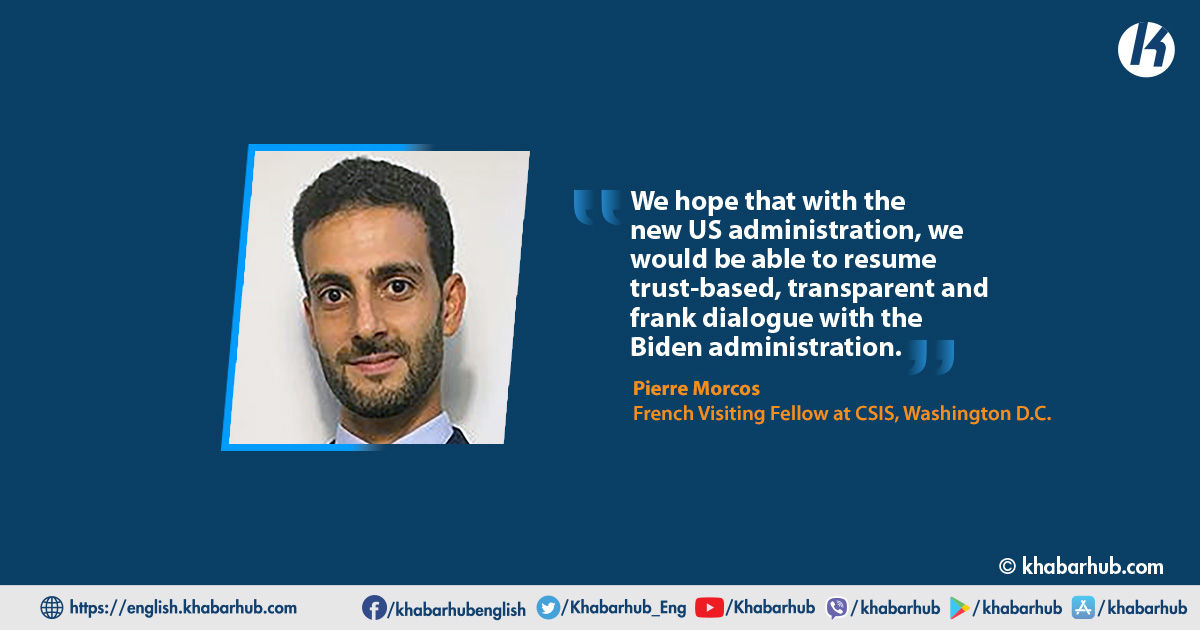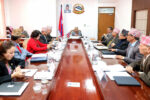Pierre Morcos is a visiting fellow in Europe, Russia, and Eurasia Program at the Center for Strategic and International Studies, where he focuses on European security issues.
A career diplomat with the French Foreign Service, he most recently served as deputy head of the Strategic Affairs and Cybersecurity Division, focusing on NATO and European defense issues. His expertise includes; Defense Budget, Defense Industry, Acquisition, and Innovation, Defense Strategy and Capabilities, Defense and Security, Europe, European Union, Geopolitics and International Security, NATO trained as a civil servant in the National School for Administration (Ecole Nationaled’Administration), he holds a B.A. and an M.P.A. from the Paris Institute of Political Studies (Sciences Po).
Dr. Pramod Jaiswal, Strategic Affairs Editor at Khabarhub, recently spoke to Pierre Morcos on the different aspects of Indo-Pacific Affairs, AUKUS and France.
How important is the Indo pacific for France? Why do you think France was excluded from AUKUS?
The Indo-Pacific is important to France not only because we have economic ties with the region as other European nations but because we have territories there.
So, what is at stake is not only our prosperity, it’s our sovereignty. We have the second-largest exclusive economic zone in the world and these maritime zones are also impacted by the instability of the region.
More importantly, France believes as many other countries that the Indo-Pacific is at the core of the stability of the world. If this region is unstable it will necessarily have an impact on our security. So, we deeply value the stability of the Indo-Pacific.
Why was France excluded [from AUKUS]? That’s one of the biggest questions France has. We do not understand why. Australia wanted to have another design for their submarines and wanted nuclear powered submarines instead of conventional powered submarines which were provided by France. However, France has this technology also, since French submarines are nuclear powered.
So, theoretically, France could have provided such technology to Australia but the main problem is the fact that Australia never put these questions on the table with the French authority. We never had the opportunity to evaluate and assess our ability and willingness to provide such technology.
I think that France was excluded mainly because the actual goal of Australia was to signal that it is closer to Washington by forging a strong alliance with the United States in the context of raising tensions with Beijing, even though that meant to exclude France and that’s disappointing.
What is the reason behind France’s dissatisfaction with America?
I think the main element of our disappointment is this breach of trust. We hoped that with the new U.S. administration we would be able to resume a trust-based dialogue. Our first contacts were very positive. We had good and fruitful discussions with the Biden administration.
As you know, President Biden visited Europe in June, it was his first international trip. Secretary Blinken went also to Paris. Our minister for foreign affairs and defense also visited Washington last July, so clearly there was a positive momentum between the two countries.
But actually, it was just a facade because in parallel there were these secret negotiations which were clearly at the expense of French economic and security interests so that’s why France is so angry about it.
Due to this huge gap between these reassuring words coming from Washington and the reality of these actions which are in a sense quite similar to the previous Trump administration.
And that’s why France is so disappointed and for Paris. Besides, it’s not only limited to these disputes it’s about a larger trend coming from Washington with a U.S. foreign policy more and more focused on the Indo Pacific and on a more limited definition of U.S. core national interests at the expense sometimes of Europe.
We experienced a similar situation with the rapid withdrawal of the United States from Afghanistan where many European Allies were deployed such as Germany or the UK. Allies were presented with a fait accompli last April when the Biden Administration informed unilaterally that it decided to withdraw the troops and imposed its calendar which led to the fall of Kabul and the disaster that we know.
So clearly, there is a trend in the US administration that is not necessarily transparent and which doesn’t genuinely consider its European allies.

What strategic impact will AUKUS have in the Indo-Pacific and Quad?
It has to be determined. My main concern is that this new alliance might provoke fragmentation in the region because this partnership is focusing on security and defense and the military competition with China, while other countries of the region are a bit unease about this balance.
Many countries have been reluctant to fully align with the US and to fully engage in this military competition and rivalry between Beijing and Washington.
This was the case previously with Australia and still is the case for South Korea, Japan, Indonesia, India and other countries.
So, I think Washington will have to clarify, what are the implications of AUKUS and what it means about their overall strategy for the region.
If their strategy is to only and primarily focus on their military competition with China, it could pose a problem for many countries of the region.
This will be the case at least for France, our strategy, of course, recognizes the necessary military balancing of China but also is concerned of not fueling the tensions and instead promoting an alternative model on the environment, trade or connectivity.
So AUKUS could make cooperation with different countries of the region more complicated, for Washington, it complicates the relationship with France and necessarily and potentially with Europe at large.
That’s why the ongoing discussion between Washington and Paris is paramount to clarify the coherence of their strategies.
Do you see France and Russia or France and China building closer ties after the AUKUS agreement?
No, I think that France has stated many times that even though it does not want to neither to fully align with Washington nor to contribute to the rivalry between Beijing and Washington, Paris is well aware that we share the same democratic values with Washington and we are allies through NATO.
So, we are not equidistant between Beijing and Washington, we are closer to Washington than to Beijing and France is also concerned by the aggressive and destabilizing actions of China across the region, notably when it comes to their actions against the freedom of navigation in the South China Sea. So, I don’t see an alignment, not at all between Paris and Beijing, and the same also goes with Russia.
France also is well aware of the aggressive posture of Russian toward Europe and France is part of the collective deterrence posture of NATO to ensure that Russia does not attack the east flank of NATO.
France has deployed troops and battle tanks in the Baltic states, for instance, on the border with Russia.
Having said that, France is also aware that we need to talk with China and Russia. Our strategy does not exclude any form of cooperation with these two countries. We believe that cooperation is needed in issues of shared interest, not only the environment, which is one the biggest priority of France as you know. Similarly, we also need to talk about arms control and how to mitigate the destabilizing effect of the new weapons systems.
The US has also such dialogues. Yesterday, the US and Russia met for instance to discuss the arms control issue.
To make a long story short, France and Europe at large perceive China both as strategic rivals as I said, notably when it comes to values; as a competitor notably in the economic realm and as a potential partner such as on climate. These three dimensions are important and France does not exclude any of these dimensions.
As AUKUS has put their allies – India and Japan in ambiguity, how would this trio expect to win against China without any allies in Asia?
I think this situation for India and Japan is a bit different as these two countries were not part of the submarine program with Australia.
So, the degree of consultation needed with them was not necessary the same. I don’t necessarily know if it was needed for Japan and India and they did not complain about that at all, they just noticed this agreement.
So, I don’t think that the way the negotiations were handled could have an impact on the cooperation with India and Japan. The big question mark I mentioned is what it means about US strategy in the region; what it means about US military strategy toward Beijing.
I’m sure that New Delhi and Tokyo have similar questions about the imbalance between this military angle and all the dimensions of these competitions.
So, these clarifications of the US strategy were needed not only for France but also for the other countries of the region which were mindful of striking a balance between the different dimensions of all their competition with Beijing.
Do you think India could play a significant role in AUKUS in the future?
It’s hard to tell. The main bulk of the AUKUS agreement is about submarines and the production of nuclear-powered submarines.
In my opinion, this part of the program will be limited to the US, UK and Australia because this is a sensitive technology. There is also a question of non-proliferation, which is also sensitive. So, I think that the three countries will keep that box closed to others.
However, there are other dimensions when it comes to cooperation on technology and other issues, and maybe the US will try to broaden the cooperation to other countries.
But, still, I think, it will be limited. That’s the main problem of AUKUS; its exclusive dimension. The fact that it excludes many of the countries, while beforehand, obviously, we had a more inclusive approach in the region.
There were, of course, different groupings, different formats; but they were not excluding each other there were overlapping and complementing each other. Now we have this military partnership which is tricky to articulate with other groupings and that is the main problem.
How do you think AUKUS and France can work together in the Indo-Pacific?”
This is the biggest question mark. I honestly don’t know. For the time being, the French authorities believe that AUKUS is incompatible with their strategy in the region because like as I said, of this focus and prioritization of military competition.
But I think that this will be resolved by our high-level dialogue with Washington. I hope that both countries will manage to find a middle path and be able to cooperate because, from a military standpoint, cooperation between the US and France is key.
Over the past few months, we noticed a growing military cooperation between two armed forces. Just to give you three examples; I mentioned before that we deployed submarines in the region from France to the Indo-Pacific and that was a long journey. The submarines did two port calls in Australia and in the US on Guam Island.
France, the US and Japan also trained in Kyushu island, a few months ago to drill on scenarios about the protection of a remote island. This was an amphibious exercise quite revealing of the depth of the defense ties between the two countries.
And one last example; in July, three Rafale combat aircrafts were projected from France to Polynesia in less than two days, this was a unique exercise. And they did only one stop in California, and then exercised with F22 in Hawaii.
So, from a military standpoint, we need each other and cooperation is important. Now a huge stumbling block is political and diplomatic.
We do not have enough trust. We do not know if our strategies are compatible enough. So, we need to resolve that diplomatic hurdle before resuming this Mil-Mil cooperation which is ongoing and which is important.
France is devastated by the agreement between the US and UK. Also, France called out their ambassadors from the US and UK. Unexpected agreement between US, Australia and UK shocked the EU nations and France which was also in NATO. In such a situation, how can France deal with it? What should be its road map?
First, the goal of France is not to break ties with the US, Australia, or the UK. We are close allies and partners, and when it comes to UK-US, we are part of the same alliance – NATO.
We closely cooperate on very different issues; such as the negotiation with Iran and their nuclear program, or in the Sahel just to name a few.
The goal of France is to resume dialogue with these countries but on a new base and in new ways. So that we can trust each other, we can be frank, transparent and have some more balanced discussions.
That’s why we have such a process with Washington, which is not just a single phone call between the two presidents- this is a long-term process in which the presidents will meet again as I say in a few weeks in Europe [in Rome on the margins of the G20].
So clearly, there is a shared desire to resume dialogue and rebuild trust. It is hard to say about Australia or the UK. At the end of the day, I hope that we will resume cooperation because there is a rationale for cooperation but Canberra and London have to make the first step. Paris won’t do so, they breached our trust so it is their responsibility to rebuild that. I hope that they would understand that and make some consultation to restart the cooperation with France.









Comment